 Why you ask? Because I went swimming at Moulton Falls. The water was icy cold and it was only in the mid 80's so I only went in once. Unfortunately my cliff-jumping partner is off being trained by the air force to defend our country so I had to go by myself. I spent a lot of time at Moulton last summer and I would like to do it again this summer . . . hopefully I can find someone to go with me. There will be a big announcement on my blog, most likely on Sunday.
Why you ask? Because I went swimming at Moulton Falls. The water was icy cold and it was only in the mid 80's so I only went in once. Unfortunately my cliff-jumping partner is off being trained by the air force to defend our country so I had to go by myself. I spent a lot of time at Moulton last summer and I would like to do it again this summer . . . hopefully I can find someone to go with me. There will be a big announcement on my blog, most likely on Sunday.
Thursday, May 31, 2007
Summer has officially begun...
 Why you ask? Because I went swimming at Moulton Falls. The water was icy cold and it was only in the mid 80's so I only went in once. Unfortunately my cliff-jumping partner is off being trained by the air force to defend our country so I had to go by myself. I spent a lot of time at Moulton last summer and I would like to do it again this summer . . . hopefully I can find someone to go with me. There will be a big announcement on my blog, most likely on Sunday.
Why you ask? Because I went swimming at Moulton Falls. The water was icy cold and it was only in the mid 80's so I only went in once. Unfortunately my cliff-jumping partner is off being trained by the air force to defend our country so I had to go by myself. I spent a lot of time at Moulton last summer and I would like to do it again this summer . . . hopefully I can find someone to go with me. There will be a big announcement on my blog, most likely on Sunday.
Saturday, May 26, 2007
Home, sweet home...
I just returned home from a road trip through some of the most amazing places of the western U.S. The coolest place was definitly Yosemite with the Grand Canyon being a close second. We also drove through Death Valley and saw the Meteor Crater in Arizona. I had a great time with my brother Joey and friends Bryan and Lucas. It is good to be able to see the natural beauty of the west and know that there is a loving God who is behind it. Here are some of the coolest pictures from the trip: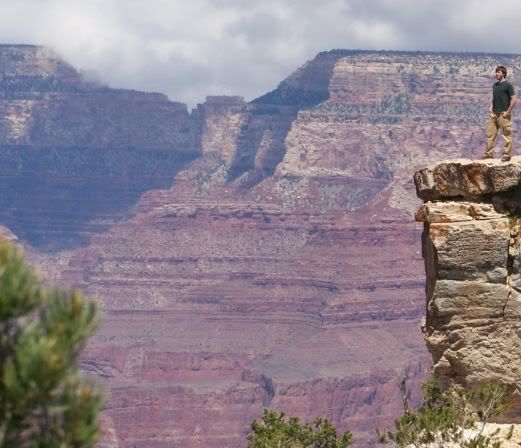 The Grand Canyon
The Grand Canyon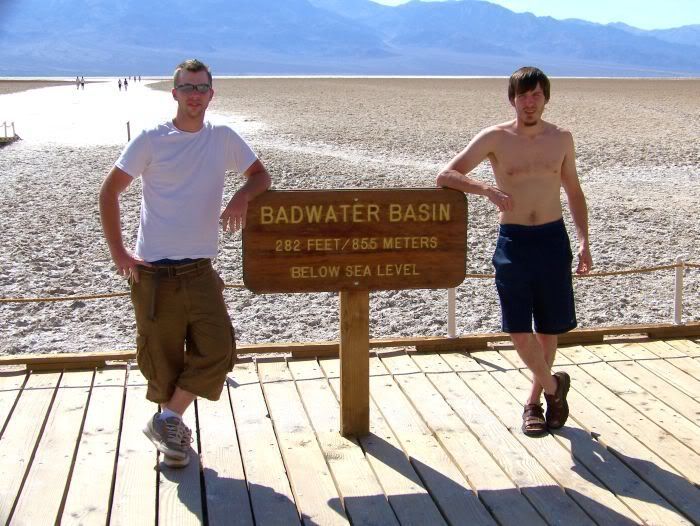 Death Valley
Death Valley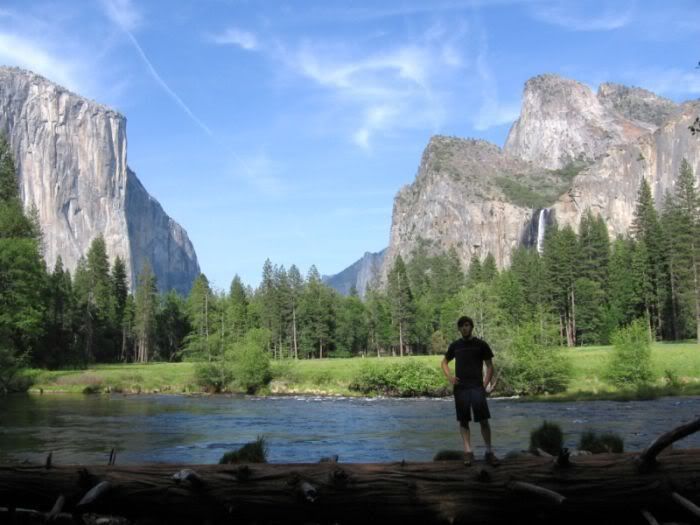 Yosemite
Yosemite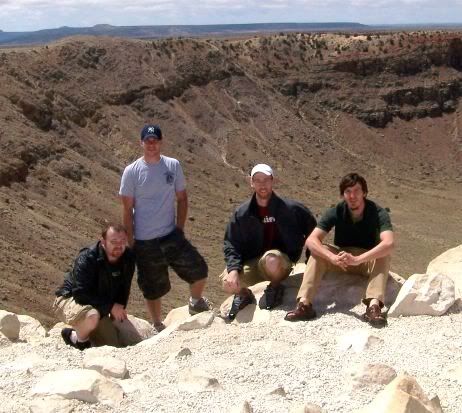 All four of us at Meteor Crater.
All four of us at Meteor Crater.
 The Grand Canyon
The Grand Canyon Death Valley
Death Valley Yosemite
Yosemite All four of us at Meteor Crater.
All four of us at Meteor Crater.
Monday, May 21, 2007
The Blessings of Asbury Part IV: Conclusion
Asbury was a place where I met the Living God. I’m tempted to think that my faith in Christ, which I thought was very real before coming to Asbury, was not real at all. I feel like at Asbury God entered my heart. Before that, faith for me was more about assent to certain doctrinal truths (which is important) and not as much about a vital relationship with my Savior. My time at Asbury has made me much more aware of the presence of God and it has also taught me how radically God will change a person’s life if we allow Him to have control. I said to someone the other day that I feel like Asbury made me a man. I know that sounds funny. I was almost embarrassed to say it but I really believe that it’s true. There was a time when I sang the hymn “On Christ the Solid Rock I Stand,” and I wished that I could believe what I was singing. I believed that I had accepted Christ as my savior and I read the Bible and prayed daily but I didn’t trust Him enough for him to be a “solid rock” for me. Now that Christ has become this “solid rock” in my life, I find it easier to face many situations and I’m much less prone to depression and anxiety. My newfound trust in Christ has perhaps most importantly given me a new confidence. I have a confidence now that whatever might happen in my life, no matter how horrible it might be, the only thing that matters is that I am obedient to God. If I am seeking and serving Him then I have nothing to worry about. I believe that for the first time in my life and I revell in the awesome freedom that that confidence brings.
Saturday, May 19, 2007
The Blessings of Asbury Part III: Friendship
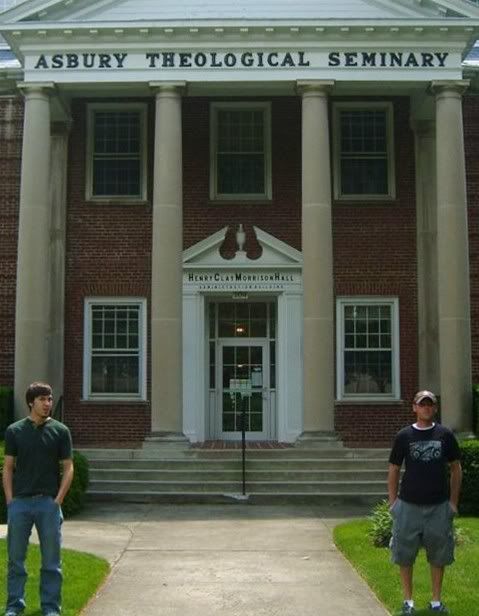 The most important blessing of Asbury Theological Seminary has been for me friendship. We have debated important issues, we have prayed for one another, we have confessed our sins to one another and we have encouraged one another toward holiness. The most transformative events that happened at Asbury for me, happened in Grice Hall. Those events were the Bible study group meetings, they were the conversations and debates that went into the morning hours, they were the times of heartfelt prayer and of crying out, "why God?" There are too many people who have blessed me greatly at Asbury to talk about but there are two who rise above the others. Those two are Blake Brodien and Ben Douglass.
The most important blessing of Asbury Theological Seminary has been for me friendship. We have debated important issues, we have prayed for one another, we have confessed our sins to one another and we have encouraged one another toward holiness. The most transformative events that happened at Asbury for me, happened in Grice Hall. Those events were the Bible study group meetings, they were the conversations and debates that went into the morning hours, they were the times of heartfelt prayer and of crying out, "why God?" There are too many people who have blessed me greatly at Asbury to talk about but there are two who rise above the others. Those two are Blake Brodien and Ben Douglass.I met Blake the first night I was at Asbury. We played poker and I remember not liking him much. Somehow we ended up becoming friends. We had Method & Praxis of Theology together and we realized how different we were from each other. Blake had grown up in an evangelical Christian home in the Bible belt. I grew up going to a liberal "church" where the gospel was not preached in the least-churched region of the country. Our diverse backgrounds has often made communication difficult. Our relationship made me realize that many people from "red state" regions underestimate the evils of liberal theology. It also has made me realize that right-wing fundamentalism can be just as bad. Blake could see during that first year of seminary that I was bitter. I was bitter about the liberalism that had withheld Christ from me and the havoc that it wreacked in my life. Blake told me that I needed to overcome that bitterness many times but I did not listen. It took hearing a word of prophecy, almost verbatim what Blake had been saying, from a pentecostal preacher the summer after that year of seminary for God to get my attention. I still have bitterness but now I'm aware of its presence and that it's something God wants me to be free of. Blake also got me through a battle with depression that first year. It was one of the toughest times in my life but Blake was always there to remind me of who God is and to pray for me. Our friendship has only deepened during our second year of seminary and I look forward to lifetime of being a blessing to one another. Blake showed me what true Christian compassion is. Being doctrinally correct and pursuing holiness are two of my most important values. Blake has taught me to add compassion to both my battle for good doctrine and my quest for holiness. Blake also has shown me a great trust in God that I can only hope someday to possess.
I didn't hit it off with Ben as fast as I had with Blake. The first time I really made a connection with Ben was when I was complaining about the problems of liberalism not far into my first year at Asbury. In Ben I found someone who was as aware as I was of the horrendous nature of theological liberalism. This realization led to many discussions about theology. Eventually we formed a "Barnabas Group" of which Blake was also a member along with two other guys. A Barnabas Group is an accountability group which combines Bible study, prayer and confession of sin along with a commitment to five disciplines. The disciplines are commitment to a certain amount of time in Scripture and prayer daily, fasting, tithing, church attendance and Scripture memorization. Our Barnabas group and more specifically my relationship with Ben has been the greatest catalyst in my life for greater holiness. I have been freed from sinful inclinations that I didn't even realize I struggled with and that I certainly never thought I would be free of. Ben has also made me more aware of the spiritual battle we are in. A big part of my growth at Asbury has come from being aware of this battle and knowing that the most important thing for a Christian to do in fighting the forces of darkness is to strive for holiness. This striving for holiness must always be built upon a faithful prayer life and time spent in the word. Ben has also showed to me how joyful and exciting a life can be where a person is seeking holiness. So often holiness is seen as boring or opposed to having fun. Through Ben I have come to see that in seeking holiness there will be many sacrifices and struggles but that He whom we are seeking to obey is so much greater than anything we might have to leave behind in our quest. Jesus says that we must deny ourselves to follow Him. Many Christians today seem not to want to hear this. Ben embraces Christian self-denial whole-heartedly and he has helped me to also.
Thursday, May 17, 2007
The Blessings of Asbury Part II: Classes and Professors
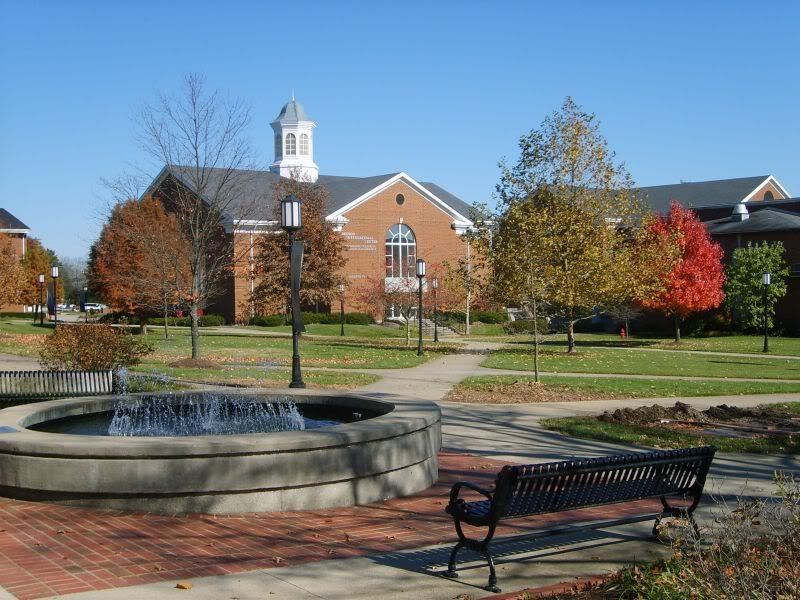 If you go to any school or educational institution you will hear people complain. We love to complain about the food in the cafeteria and the weird guy who lives upstairs in the dorm. We also love to complain about classes. I can join in complaining about some of the classes here. KCW and VOM were both wastes of time. But I've also had some amazingly good classes here:
If you go to any school or educational institution you will hear people complain. We love to complain about the food in the cafeteria and the weird guy who lives upstairs in the dorm. We also love to complain about classes. I can join in complaining about some of the classes here. KCW and VOM were both wastes of time. But I've also had some amazingly good classes here:COURSES
Church History 1 & 2 with Dr. Steven O'Malley. I love history and these classes did more to inform me on what it means to be Christian, perhaps more than any others that I took. Dr. O'Malley is very interested in Luther and Pietism among other things and his lectures on these topics were quite good. One of our biggest problems in the church is that we don't know where we came from and many of us think that it's not important. I think if more people took classes like these two, many of our disagreements would disappear if people had the humility to admit their mistakes. I think our willingness to compromise with our decadent culture on doctrine and practice would also decrease if we were all more mindful of the holiness and sacrifice seen in so many of the Saints of the Church.
The Gospel of Matthew with Dr. David Bauer. One thing Asbury has shown me is that people can be extremely intelligent and learned and still believe the Bible. Dr. Bauer is a prime example of this. This class has helped me to catch more of what is going on in Scripture.
Old Testament with Dr. Lawson Stone. I had no idea of how little I knew about the Old Testament before I took this class. The history I learned in this course was intriguing. Dr. Stone also provided a great amount of often not-so-appropriate humor to keep the class interesting. I also like Stone because he is very critical of postmodernism and isn't embarrassed about being a conservative.
Suffering, Tragedy and the Christian Faith with Dr. Jerry Walls. This is the best class I have ever taken. The readings were great and the class discussion was very instructive. The reading included an overview of modern attempts to deal with evil from the likes of Leibniz, Rousseau, Voltaire, Kant and Nietzsche among others. I came out of that portion of the course with a better understanding of the thought of those philosophers than an undergraduate philosophy course plus a lot of my own reading could give me. We reviewed some theodicies such as Plantinga's and then read a book that has changed my life: The Doors of the Sea by Orthodox writer David Bentley Hart. This book has revolutionized the way I look at the problem of evil. I would say that this course should be required but that would probably ruin it.
PROFESSORS
Dr. Steven O'Malley: Dr. O'Malley is perhaps the kindest and most humble Christian man I know. I could learn a lot from his patience and thoughtfulness in dealing with ideas. He always tries to see the best in people and he is very optimistic when it comes to what God is doing in the world. Optimism, and I'll admit it - humility, are not my strong points so I need to be around people like Dr. O'Malley to set me right. I took Church History 1 & 2, Sacraments in History and The Theology of John Calvin with Dr. O'Malley.
Dr. Jerry Walls: Dr. Walls is a clear-thinking intellectual with a hunger for truth. He doesn't compromise with the lack of logic that is prevalent in liberalism and postmodern thought. He actually believes in the law of non-contradiction which in this day and age is a breath of fresh air. Dr. Walls' classes engage my mind fully and inspire me to use my intellect to its full potential. If I could, I would take every class he offered.
In some ways Dr. O'Malley and Dr. Walls are opposites. My natural inclinations certainly lean toward the ways in which Walls thinks and confronts the world. If there were more men like Dr. Walls in the church I would be much more optimistic about it. But I also know that I have a lot to learn from men like Dr. O'Malley. Even though things may look dark, he joyfully trusts God and believes that He is working even in the midst of those with whom we disagree.
Wednesday, May 16, 2007
The Blessings of Asbury Part I: St. Patrick's Church
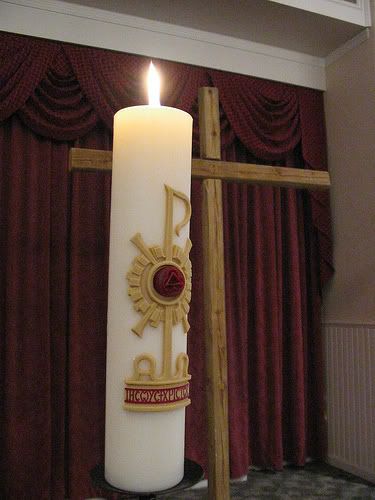 Now that finals are winding down and as I prepare to leave Asbury, I want to reflect on the amazing blessings I have received from God at this place. I have been at the seminary for almost two years now and my life has been transformed more profoundly in this time than any other equivalent period of my life. The first subject I will write on is the church I have attended almost the whole time I have been here. I found St. Patrick's church, thanks to my friend Ed, the third week I was at Asbury. The three great blessings of St. Patrick's I want to concentrate on are: St. Patrick's has allowed me to find God in the Eucharist and the liturgy; the preaching of our priest, Father Peter Matthews; and last but not least, the community at St. Patrick's - the people I've met in this church.
Now that finals are winding down and as I prepare to leave Asbury, I want to reflect on the amazing blessings I have received from God at this place. I have been at the seminary for almost two years now and my life has been transformed more profoundly in this time than any other equivalent period of my life. The first subject I will write on is the church I have attended almost the whole time I have been here. I found St. Patrick's church, thanks to my friend Ed, the third week I was at Asbury. The three great blessings of St. Patrick's I want to concentrate on are: St. Patrick's has allowed me to find God in the Eucharist and the liturgy; the preaching of our priest, Father Peter Matthews; and last but not least, the community at St. Patrick's - the people I've met in this church.I Eucharist and Liturgy
Before I came to Asbury I had read some Catholic and Orthodox authors, particularly Chesterton, a Kempis and Dostoyevsky, which made me more open to those traditions. I had also become friends with a Catholic guy, who had great knowledge of the Fathers and an obvious devotion to Christ, at the book store I worked at in Vancouver, Wash. So when I came to Asbury I was ready to embrace liturgy and to have my understanding of the eucharist changed. St. Patrick's has been the perfect classroom to learn more about the liturgy. As my priest has said, "Liturgical prayer forces me to pray in line with the redemptive historical narrative of scripture. Liturgical prayer forces me to pray in line with God's will disclosed in scripture and the living tradition of the Church." I have also come to see that Scripture and the Church through the ages were serious when they said that the Presence of Christ is really in the eucharist. When you think of how God has chosen to relate to man, that is, incarnationally in His Son our Lord Jesus Christ, then it makes sense that God would continue to meet us materially. This happens in the eucharist. I believe that God meets me every week substantially there. I find that I have a hunger for it and and am fed spiritually each week when I take the true Body and Blood of Christ in the eucharist.
II The Preaching of Father Peter Matthews
I have been greatly blessed by the preaching of Father Matthews. His preaching is authentic and doesn't have the off-putting quality of some highly polished mega-church style sermons. Peter preaches from Scripture and he gives the word of God the highest authority in his sermons. He also often cites personal experience in his sermons which makes them easier to connect to our own lives. I wish that I would have taken notes more often at St. Patrick's but one sermon I do remember was on the line from the Lord's prayers, "Thy Kingdom come on earth as it is in Heaven." Peter defined the Kingdom as God's reign. He said that this was not a prayer of resignation like in Gethsemane and that Jesus isn't talking about us going to Heaven but about Heaven coming to us. I loved Peter's image of Heaven being right on the other side of a curtain, that it is real and immanent. This imagery made me think of an experience I once had when I was deep in prayer. I suddenly became profoundly aware of God's presence behind every object in the room, I felt that there was a kind of brightness behind the very blanket on my bed which I clutched as I prayed. It was one of the most mystical experiences I've ever had and I thank God for it. Another good point Peter made was that we don't build the Kingdom of God, God does. We are to be a witness to the Kingdom God has built and is building. We are to live lives that show what it looks like when God is in charge. Peter said in this sermon that discontentment comes from our placing our longing for hope and fulfillment in temporal things when our longing for hope should be placed on the Kingdom of God. He identified some basic longings that are fulfilled when the curtain is pulled back and the Kingdom is revealed, our longings for justice, beauty and for relationship and that these are all fulfilled in God.
III The Community
When I went on a church retreat earlier this year I became much more aware of how amazing the congregation at St. Patrick's is. We have a congregation of interesting people of diverse backgrounds who know how to have a good time and seek to serve the Lord and one another. It's been great going to church with some seminary people I've gotten to know better. Dr. Tsoukalas and his wife Sandy Richter go to St. Pat's and I've gotten to know him a little better. It has been interesting to hear him talk of the problems of postmodernism and how naively it has been embraced in many Christian circles. He encouraged me not to give up on Protestantism just yet and that people who will stand firm for doctrine should stay and fight - so that's what I'm doing. Another one of my favorite people at St. Pat's is Hubert who is a Greek professor at the University of Kentucky. It's great to see a committed Christian in the context of the secular university and I have been greatly impressed by his wisdom and great knowledge of a diversity of topics. I regret not having gotten to know many of my brothers and sisters at St. Patrick's church better.
Thursday, May 3, 2007
Wisdom from our elders III: Dr. David Bauer
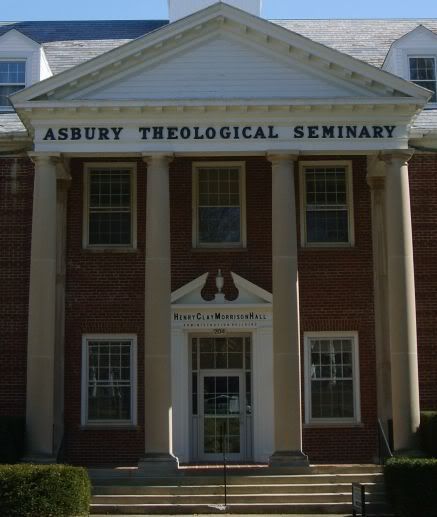 On Tuesday our Barnabas Group (Bible study, prayer, accountability) had our last meeting with an "elder" from our seminary. We had the idea of inviting a more mature Christian once a month to share wisdom and insight about the Christian life. Earlier in the semester we had Dr. Joe Dongell and Emmanuel Akanet come and share with our group. This Tuesday we welcomed Dr. David Bauer, the dean of the School of Biblical Interpretation and Proclamation and Professor of Inductive Biblical Studies at Asbury Theological Seminary. Dr. Bauer is highly respected as one of the greatest intellects on campus and his knowledge of the minutest details of the Gospel of Matthew is quite amazing.
On Tuesday our Barnabas Group (Bible study, prayer, accountability) had our last meeting with an "elder" from our seminary. We had the idea of inviting a more mature Christian once a month to share wisdom and insight about the Christian life. Earlier in the semester we had Dr. Joe Dongell and Emmanuel Akanet come and share with our group. This Tuesday we welcomed Dr. David Bauer, the dean of the School of Biblical Interpretation and Proclamation and Professor of Inductive Biblical Studies at Asbury Theological Seminary. Dr. Bauer is highly respected as one of the greatest intellects on campus and his knowledge of the minutest details of the Gospel of Matthew is quite amazing.Dr. Bauer began with his story. He was born into a devout Free Methodist family. He said that he could not remember a time when he didn't have faith in God. In his parents he saw, "such authentic, genuine life that he was drawn to it."
Dr. Bauer went to Spring Arbor College and then came to Asbury Theological Seminary right out of college. His first year at Asbury was an unhappy one. Dr. Bauer struggled with whether or not he should be in Christian Education or be a pastor. He said that one experience he had while working at a church helped him to decide. He did not enjoy pastoral visitations but was on one and he found himself going through the conjugations of Greek verbs in his head during the visitation. This helped him to realize that education was probably a better route for him than pastoral ministry.
He got his Ph.D. at Union Theological Seminary and was immediately hired at Asbury. One challenge that Dr. Bauer mentioned about Asbury is that it can be a place where people want to look holy and this can discourage honest discussion about struggles and confession of sin. He stressed the importance of confession of sin saying, "one of the best ways to deal with sin is to acknowledge our failures." He said that Christian perfection begins with the recognition that one is not perfect.
An important aspect of his spiritual growth was his relationship with three men who served as mentors for him. He called them, "people in whom I saw Christ revealed most positively." All three of these men were professors in biblical studies. The most important of the three was Dr. Robert Traina who was a professor at Asbury. He said that these men taught him how to be a man. He said they taught him how to process things, how to relate to people and that they taught not only psychological and social maturity but also spiritual maturity.
When it came to the subject of his personal devotion, Dr. Bauer emphasized prayer and Bible study. He said that he gives specific times to prayer but also that he has a sense of constantly being in the presence of God and constantly being in conversation with God. He reminded us of Paul's words to, "pray without ceasing." He said concerning prayer and worship, "special times exist to indicate that there are no special times. They indicate that all time is sacred." Concerning Bible study, Dr. Bauer said that he doesn't like to separate devotional and academic reading of the Bible. He said that academic reading of the Bible should be worship.
When it comes to books outside of the Bible that have been highly influential for Dr. Bauer's life, he mentioned Bonhoeffer, Patristic literature, Luther, Calvin, Barth and Bruner.
It was wonderful to have Dr. Bauer with us. I felt a strong sense of holiness from Dr. Bauer and I believe that his words about abiding constantly in the presence of God are very true.
Wednesday, May 2, 2007
A Great Meditation on Materialism: Clouds of Atoms Making Mistakes
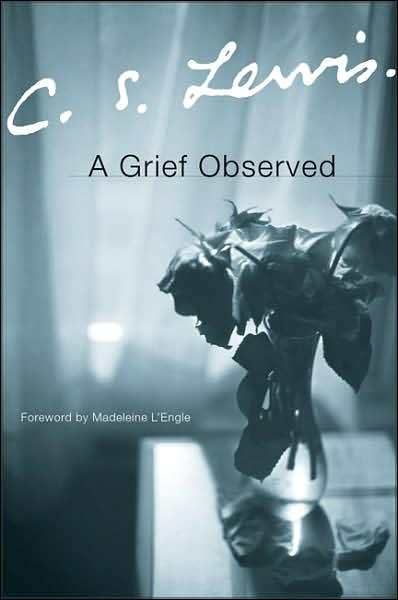 (Here Lewis considers naturalistic materialism as he struggles with grief at the loss of his wife whom he refers to as H.)
(Here Lewis considers naturalistic materialism as he struggles with grief at the loss of his wife whom he refers to as H.)Come, what do we gain by evasions? We are under the harrow and can't escape. Reality, looked at steadily, is unbearable. And how or why did such a reality blossom (or fester) here and there into the terrible phenomenon called consciousness? Why did it produce things like us who can see it and, seeing it, recoil in loathing? Who (stranger still) want to see it and take pains to find it out, even when no need compels them and even though the sight of it makes an incurable ulcer in their hearts? People like H. herself, who would have truth at any price.
If H. 'is not,' then she never was. I mistook a cloud of atoms for a person. There aren't, and never were, any people. Death only reveals the vacuity that was always there. What we call the living are simply those who have not yet been unmasked. All equally bankrupt, some not yet declared.
But this must be nonsense; vacuity revealed to whom? Bankruptcy declared to whom? To other boxes of fireworks or clouds of atoms. I will never believe - more strictly I can't believe - that one set of physical events could be, or make, a mistake about other sets.
-C.S. Lewis, A Grief Observed
Subscribe to:
Posts (Atom)


